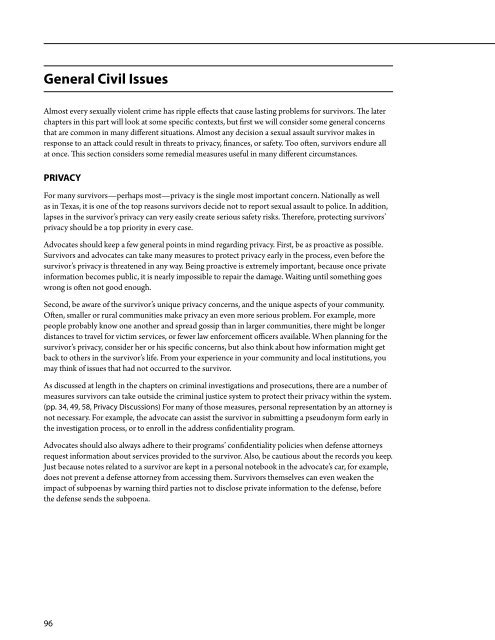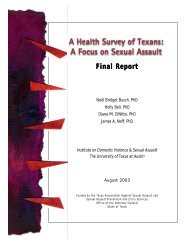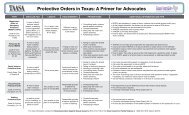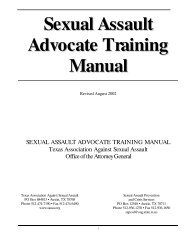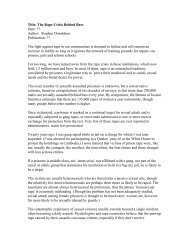Sexual aSSault LEGAL ADVOCACY MANUAL - Texas Association ...
Sexual aSSault LEGAL ADVOCACY MANUAL - Texas Association ...
Sexual aSSault LEGAL ADVOCACY MANUAL - Texas Association ...
You also want an ePaper? Increase the reach of your titles
YUMPU automatically turns print PDFs into web optimized ePapers that Google loves.
General Civil Issues<br />
Almost every sexually violent crime has ripple effects that cause lasting problems for survivors. The later<br />
chapters in this part will look at some specific contexts, but first we will consider some general concerns<br />
that are common in many different situations. Almost any decision a sexual assault survivor makes in<br />
response to an attack could result in threats to privacy, finances, or safety. Too often, survivors endure all<br />
at once. This section considers some remedial measures useful in many different circumstances.<br />
Privacy<br />
For many survivors—perhaps most—privacy is the single most important concern. Nationally as well<br />
as in <strong>Texas</strong>, it is one of the top reasons survivors decide not to report sexual assault to police. In addition,<br />
lapses in the survivor’s privacy can very easily create serious safety risks. Therefore, protecting survivors’<br />
privacy should be a top priority in every case.<br />
Advocates should keep a few general points in mind regarding privacy. First, be as proactive as possible.<br />
Survivors and advocates can take many measures to protect privacy early in the process, even before the<br />
survivor’s privacy is threatened in any way. Being proactive is extremely important, because once private<br />
information becomes public, it is nearly impossible to repair the damage. Waiting until something goes<br />
wrong is often not good enough.<br />
Second, be aware of the survivor’s unique privacy concerns, and the unique aspects of your community.<br />
Often, smaller or rural communities make privacy an even more serious problem. For example, more<br />
people probably know one another and spread gossip than in larger communities, there might be longer<br />
distances to travel for victim services, or fewer law enforcement officers available. When planning for the<br />
survivor’s privacy, consider her or his specific concerns, but also think about how information might get<br />
back to others in the survivor’s life. From your experience in your community and local institutions, you<br />
may think of issues that had not occurred to the survivor.<br />
As discussed at length in the chapters on criminal investigations and prosecutions, there are a number of<br />
measures survivors can take outside the criminal justice system to protect their privacy within the system.<br />
(pp. 34, 49, 58, Privacy Discussions) For many of those measures, personal representation by an attorney is<br />
not necessary. For example, the advocate can assist the survivor in submitting a pseudonym form early in<br />
the investigation process, or to enroll in the address confidentiality program.<br />
Advocates should also always adhere to their programs’ confidentiality policies when defense attorneys<br />
request information about services provided to the survivor. Also, be cautious about the records you keep.<br />
Just because notes related to a survivor are kept in a personal notebook in the advocate’s car, for example,<br />
does not prevent a defense attorney from accessing them. Survivors themselves can even weaken the<br />
impact of subpoenas by warning third parties not to disclose private information to the defense, before<br />
the defense sends the subpoena.<br />
96


